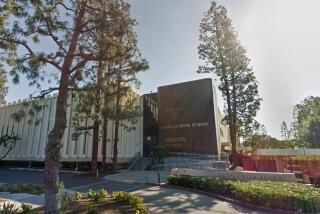Student Web Sites Pose Rising Test of Free Speech Rights
Student Web sites are pushing the envelope of free speech nationwide, forcing teachers, students, parents--and their attorneys--to contend with the fallout of unfettered adolescent expression.
The ease of starting such sites, and the anonymity they afford, complicate efforts to rein them in or hold anyone accountable, as the case of SchoolRumors.com illustrates.
That Southern California site was shut down last week after being accessed more than 67,000 times since mid-February. At its demise, it was loaded with disparaging, explicit remarks about Southland teenagers, teachers, principals and schools.
SchoolRumors.com is part of a growing cadre of underground high school papers and Web pages sprouting up in cyberspace.
“This is a big, spreading trend,” said Ann Beeson, a lawyer with the American Civil Liberties Union in New York.
“It seems like seldom a week goes by that we don’t deal with a situation like this somewhere in the country,” said Mark Goodman, executive director of the Student Press Law Center in Arlington, Va.
These sites are not just emotionally devastating to students; they can presage violent acts, as was the case in the Columbine massacre two years ago.
Many of the postings on SchoolRumors.com were full of violent imagery, especially significant in light of Monday’s tragic high school shootings in San Diego County.
“All the trendy . . . pop kids need to be lined up in front of a wall and shot in the head so I can watch their heads splatter and their brains and blood run down the wall and laugh,” one SchoolRumors entry read.
In recent years, schools’ efforts to punish students for Web-related activities have given rise to a few court cases. There were two in Washington state and one each in Pennsylvania and Missouri.
In all but the Pennsylvania case, which involved a student threat, courts have ruled that schools do not have authority to punish students for what they say on Web sites set up outside of school.
Julie Underwood, general counsel for the National School Boards Assn., warned recently that districts should be cautious when disciplining students for offensive Web sites that are created on something other than school equipment.
“Students have 1st Amendment rights [of free speech],” she said. “They can criticize the faculty, they can criticize each other.”
But sites step over the line, she said, when the electronic repartee moves from crassness to threats.
That was the case in Bethlehem, Pa., where a middle school student was expelled after posting profane comments about his math teacher.
The Web site showed a picture of her severed head dripping with blood, a picture of her face “morphing” into Hitler’s and a solicitation for funds to hire a hit man to kill her.
The math teacher suffered from anxiety and missed some of the school year. A Pennsylvania appellate court upheld the student’s expulsion, finding that the speech constituted a threat against the teacher.
In other cases, students have prevailed in court.
Inspired by a creative writing class assignment, Nick Emmett, a Kentlake High School student in Kent, Wash., put up a site containing mock obituaries of friends. Visitors to the site were asked to vote on who should “die” next. The title, “The Unofficial Kentlake High School Web Site,” was shown engulfed in flames.
Someone other than Emmett posted on a linked online bulletin board a photo of the school principal with the comment: “Pick me. I want to die.”
Kent School District suspended Emmett, now 19, for five days, and the ACLU filed a suit on his behalf. After a federal court overturned the suspension, the district settled the case, paying Emmett $1 in damages and $6,000 in legal fees.
The court held that the speech was not intended to threaten anyone.
Emmett, now attending a community college, said he regrets that the suspension forced him to miss playing in a basketball playoff. Otherwise, he said, he feels no regrets because “it was good to prove students’ rights to free speech.”
Another Washington state student prevailed in court on 1st Amendment grounds despite having a Web site described by a court as “highly offensive, vulgar, sexually explicit and lewd.” The site was dedicated to mocking his principal, who was pictured having sex with cartoon character Homer Simpson and sodomizing a pig.
When SchoolRumors.com was first registered, its e-mail address was listed as bbcrooter@mail.com. An official at the site’s Internet host said its billing address was in Northridge.
BBC Rooter & Plumbing is the name of a Northridge plumbing company. Its owner, Bob Behzadi, said Friday that he knew who had created the site but that he had nothing to do with it.
*
Times staff writer Massie Ritsch in the San Fernando Valley and columnist Sandy Banks contributed to this report.
More to Read
Start your day right
Sign up for Essential California for news, features and recommendations from the L.A. Times and beyond in your inbox six days a week.
You may occasionally receive promotional content from the Los Angeles Times.







